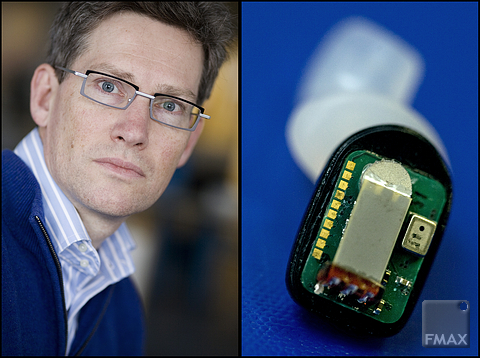Delta and Delft Integraal often write about innovative ideas that offer big promises for the future. But what has happened to such ideas a couple years on? What for instance has happened to the dynamic earplugs?
Delta, 09-11-2006
Wearing earplugs all day and still being able to talk to colleagues. That will soon be possible with the earplugs created by TU alumnus Engbert Wilmink, which only muffle sound when it is necessary.
They’re not much bigger than a pill, but the smart earplugs created by Engbert Wilmink have a lot more technology in them than one would think after a quick glance. The dynamic earplugs contain for instance a microphone that detects sound levels. The earplugs only reduce the sound level when there is loud noise higher than eighty decibels. When this occurs, a valve closes in the earplug. “People who wear earplugs at work don’t actually need to wear them for eighty percent of the time”, says Wilmink, who founded the Dynamic Ear Company. “My dynamic earplugs make it possible for them to hear everything normally for that eighty percent of the time, and thus they are able to have conversations with each other. Yet at the same time their ears are protected when they’re standing near a machine and there is a lot of noise.” The earplugs reduce sound up to 34 decibels.
The dynamic earplugs were regarded as very promising four years ago, with industry applauding the invention of Wilmink, who came up with the idea when he worked at TNO. In early 2007, Wilmink had high hopes that his earplugs would be on the market by the end of that year. But the process turned out to be much more complicated. “It was necessary to invest a lot of money in the technology of the earplugs”, Wilmink says. “We needed more investors to cover the costs, but it was harder to find them than I had expected. Investors were reluctant because they had to invest in the development of a chip, and that would not give them a quick profit.” The financial crisis made it even more difficult to get investors on board. “Last year things were very tough”, Wilmink adds.
But his company overcame that bad year and the struggle to find investors. This year started with good news: Wilmink finally found an investor. The dynamic earplugs will be available this year.
Last year Wilmink had already started selling passive filters, which are filters that can be put in a specialised earplug to reduce sound. “Our filters are cheaper than those of the competition, and because of the crisis, many companies are looking for cost-reductions, so consequently buy our filters.” Wilmink is also making new plans for other products based on the technology behind his earplugs: “If you use the technology in earplugs for phones and mp3 players, you’ll be able to reduce background noise, and therefore you will hear music and phone conversations more clearly.”
Dat blijkt uit de Keuzegids Deeltijdstudies, waarin voor het eerst deeltijdopleidingen met elkaar worden vergeleken. De TU Delft komt in de ranglijst niet voor.
In een inleidend artikel maken de auteurs zich zorgen over de staat van het deeltijdonderwijs. Als grootste probleem zien zij de ‘gaten in het aanbod’ van opleidingen, want er is de afgelopen jaren flink gesnoeid. Bepaalde disciplines worden nauwelijks in deeltijd aangeboden. Ook verschilt het aanbod sterk per regio.
De meeste deeltijdopleidingen worden aangeboden aan hogescholen, maar ook universiteiten hebben speciale programma’s voor deeltijdstudenten. Vooral daar laat de situatie te wensen over. Als een universitaire opleiding al in deeltijd wordt aangeboden, komt het er vaak op neer dat de studenten overdag moeten aanschuiven bij de voltijders. Veel disciplines zijn alleen toegankelijk voor voltijdstudenten, wat volgens de auteurs opmerkelijk is in een tijd waarin Nederlanders geacht worden hun leven lang te leren.
Een populaire academische deeltijdstudie is rechten, maar de kwaliteit ervan is aan alle universiteiten middelmatig, schrijft de Keuzegids. Goede resultaten worden behaald bij geschiedenis in Groningen en Leiden, Engels in Leiden en wijsbegeerte in Tilburg en aan de VU in Amsterdam. Groningen scoort excellent bij theologie en religiestudies, maar daar lopen slechts acht deeltijders rond.
De Open Universiteit, die zich van oudsher richt op deeltijdstudenten, haalt het beste gemiddelde oordeel, op korte afstand gevolgd door de Radboud Universiteit Nijmegen, de Rijksuniversiteit Groningen en de Erasmus Universiteit Rotterdam. Daarbij moet worden aangetekend dat het aanbod in Nijmegen en Rotterdam heel beperkt is. Aan de Universiteit van Amsterdam worden wel veel deeltijdopleidingen aangeboden, maar die instelling krijgt een ‘bedroevend lage beoordeling’.
De hogescholen scoren beduidend hoger dan de universiteiten. Sommige van hen bieden uitstekende deeltijdopleidingen. Als allerbeste hogeschool komt een kleine speler uit de bus, de Katholieke Pabo Zwolle. Van de grotere instellingen hebben de Christelijke Hogeschool Ede en de Hogeschool Zuyd de beste deeltijdopleidingen.
De opleidingen worden in de Keuzegids beoordeeld op onder meer de groepsgrootte van colleges en werkgroepen, studierendementen en accreditatieoordelen. Zwaar wegen de oordelen van de deeltijdstudenten. Zij zijn bevraagd over het studieprogramma, de docenten en hun manier van lesgeven, de aansluiting op de beroepspraktijk, de communicatie en de aanwezige faciliteiten.



Comments are closed.